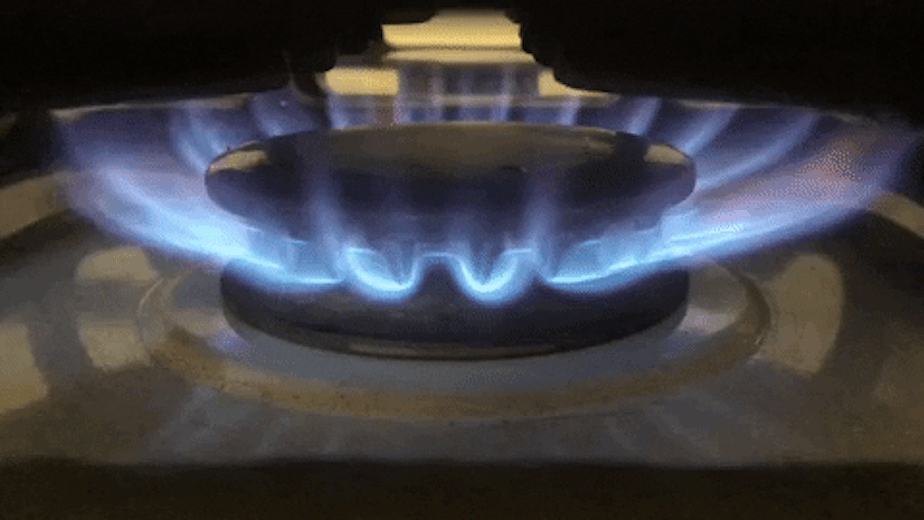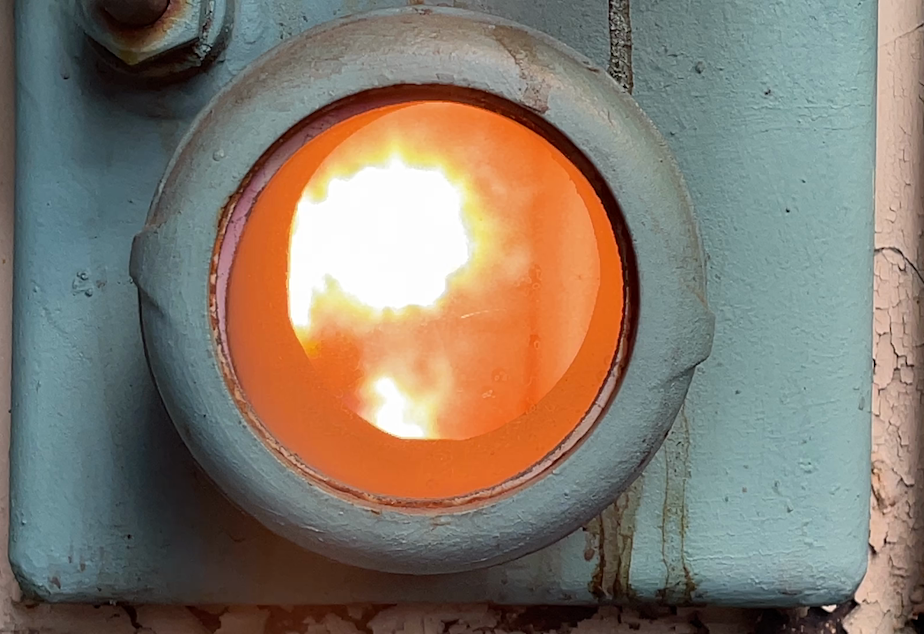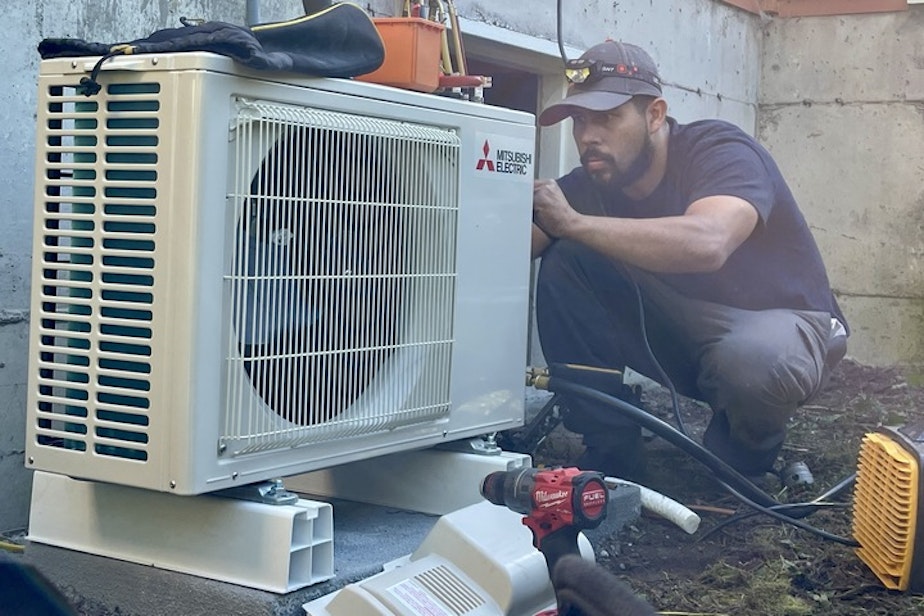Energy foes spar with misleading claims over natural gas Initiative 2066

"Stop the gas ban," roadside signs and online ads urge Washington voters, even though gas hasn’t been banned in Washington.
To fight climate change, the state aims to phase out fossil fuels, including natural gas, by 2050, and the state’s building code in 2023 made it difficult for builders to install gas appliances in new construction.
Initiative 2066 would roll back local and state efforts to transition away from gas over the next quarter century. It would also block Washington’s building code from doing anything to “prohibit, penalize, or discourage the use of gas for any form of heating.”
It is one of two measures on the November ballot that could shape what kind of energy people in Washington use and how much pollution they produce.
The state’s most expensive political fight in 2024 has been over Initiative 2117. That measure would revoke the state’s cap on carbon emissions, gutting the state’s efforts to fight climate change but saving polluting businesses billions annually.
Initiative 2066 has attracted less campaign spending and scrutiny. It would stop efforts to regulate natural gas and guarantee builders the right to keep installing it and consumers the right to keep using it indefinitely.
Sponsored
About a third of homes in Washington state rely on natural gas, mostly for space heating and hot water, with cooking a minor player, but one that many cooks feel strongly about.

Gas is not a minor player when it comes to climate change. It is responsible for at least 20% of Washington’s contribution to overheating the planet, according to the state’s latest greenhouse gas inventory, from 2019.
Backers of Initiative 2066 falsely call gas a “clean energy source” and suggest that the government is already coming to take your gas stove away.
“Today, we're talking about I-2066, protecting clean natural gas and energy choice,” states an ad from Let’s Go Washington, the conservative group behind all four measures on the Washington ballot this fall. “Don't be gaslit. Keep your gas lit with I-2066 this November.”
Sponsored
Natural gas is mostly methane, a climate super-pollutant. Even small amounts of methane leaking out can make natural gas as polluting as coal.

 10 secs
A peek inside a gas-fired boiler at the University of Washington in Seattle's steam plant, the main source of heat and carbon dioxide emissions at the university, on May 15, 2023.
10 secs
A peek inside a gas-fired boiler at the University of Washington in Seattle's steam plant, the main source of heat and carbon dioxide emissions at the university, on May 15, 2023.
A 2023 study in the journal Environmental Research Letters found that just 0.2% of methane leaking before reaching end users can make natural gas as harmful to the climate as coal. In western Canada, where most of Washington state’s gas supply comes from, researchers have reported methane leaking at rates ranging from 0.4% to 1.1%.
Washington state’s greenhouse gas inventory does not account for methane leaks from natural gas before it enters the state, so it fails to capture the fuel’s full climate impact.
Inside the home, studies show gas stoves can be a health hazard, boosting concentrations of nitrogen dioxide and the lung disease and childhood asthma it can cause.
Sponsored
Clean energy, gas is not.

Among other provisions, Initiative 2066 would repeal much of a 2024 state law that requires Puget Sound Energy, Washington’s biggest utility, to develop a long-term plan for switching from gas to electricity.
Backers of Initiative 2066, which include construction and fossil-fuel industry groups, say they are not opposed to electrification.
“It should be the customer's choice. It shouldn't be forced upon them by some sort of government dictate,” said Yes on 2066 campaign spokesperson Greg Lane with the Building Industry Association of Washington.
Sponsored
“Natural gas service in the Puget Sound Energy service area is going to be turned off, and whether that's, you know, in two, three, four, five years down the road, that is the intent of the legislation.”
It’s more like 20 years down the road.
Rather than banning gas, Washington state law currently requires utilities to provide gas to anyone in their service area who asks for it.
For now, only new construction faces disincentives to installing natural gas in the state building code, which mandates levels of energy efficiency in new buildings that inherently inefficient gas furnaces make difficult to achieve.

Since voters often vote their pocketbooks, the Yes and No campaigns are both claiming that if they lose, your energy bills will go up.
“Vote yes, pay less,” Yes ads proclaim.
“If voters pass I-2066, it could add $150 more to your family’s utility bill in the coming years,” a No ad claims.
Both claims are misleading: They refer to speculative cost increases that might occur a decade or more in the future.
The No ad is referring to an annual $150 cost increase the nonprofit Climate Solutions predicts will take place in 10 years without the long-term utility planning that I-2066 would prevent. Instead, the ad makes it sound like a single monthly utility bill could rise by $150 as soon as next year.
Sponsored
As anyone who has installed a heat pump knows, switching from gas to electricity can be expensive, even if there are other benefits.
“When you're upgrading to a heat pump, you're basically getting two appliances in one. You're getting air conditioning and heating both. That is highly efficient,” said climate activist Leah Missik with Climate Solutions and the No on 2066 campaign.
Unlike some gas utilities, Puget Sound Energy has not taken a position on the initiative. It has issued factsheets to dispel what it calls "misinformation" around the measure.
“Initiative 2066 does not change PSE’s existing obligation to serve any customer who wants natural gas,” a Puget Sound Energy factsheet states. “Specifically, there is no ban on natural gas and customers are not being forced to electrify. Customers retain the choice to continue using natural gas.”
The state’s largest utility also says Initiative 2066 would have no direct effect on customers’ energy bills.
Utility rates are set by the Washington Utilities and Transportation Commission in a process that is unaffected by Initiative 2066.
Under the measure, utilities would still be required to offer assistance to low-income customers to pay their bills and to afford electrification, should the customers choose to go electric.
Initiative backers say they have no problem with utilities offering incentives to help low-income households adopt efficient, electric appliances.
But opponents say the measure is so broadly worded that it would hurt low-income utility customers.
“Initiative 2066 would increase energy bills for Washington families, and it would jeopardize programs that help people living on low incomes have access to more efficient home appliances that save money,” low-income housing advocate Patience Malaba with the Housing Development Consortium of Seattle-King County says in a No campaign video.
University of Washington law professor Hugh Spitzer says ballot measures are often so poorly crafted, they’re unconstitutional.
“Initiatives tend to be one sided, and so they don't benefit from the give and take of the legislative process,” Spitzer said.
Under the Washington constitution — and a legal tradition going back more than 2,000 years to ancient Rome — a given law or ballot measure can only concern a single subject.
The goal is to prevent “logrolling,” or squeezing different topics into one measure to scoop up as many votes as possible.
“You don't want somebody to sneak a topic into legislation where there's not enough fair warning to the legislators in the title of the legislation or to the voters in the ballot title,” Spitzer said.
Backers of 2066 say they carefully crafted the measure to survive legal challenges.
“Every single section of 2066 addresses protecting the choice to access and use natural gas,” Yes campaign spokesperson Janelle Guthrie with the Building Industry Association of Washington said in an email.
The measure would overturn various local and state laws to do that.
Spitzer says the 22-page-long initiative would likely fail the single-subject test in court.
“You can't have a short-term item, something that makes a change right away, and other changes that are very broad and long-term,” he said.
Opponents say they plan to sue if Washington voters do approve Initiative 2066 in November.




